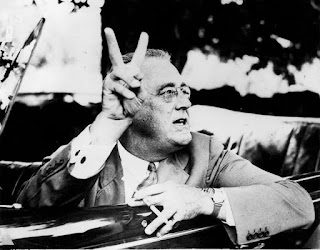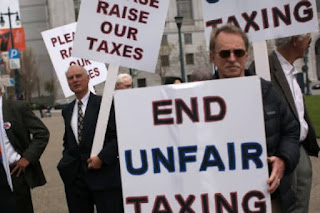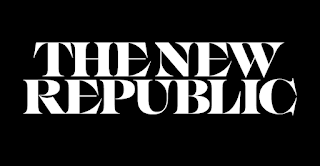 |
| Source:Wikipedia- former U.S. Senator Judd Gregg (Republican, New Hampshire) |
"We are now in one of the unique times in American governance. The music has stopped and everyone either has their chair … or has none. The players know and understand their portfolio of power.
This is important.
Under our system, unlike a parliamentary system, there are only narrow windows of time when the people who govern can actually govern free of the need to focus primarily on the next election.
{mosads}President Obama, Speaker John Boehner (R-Ohio) and the leaders of the Senate — Harry Reid (D-Nev.) and Mitch McConnell (R-Ky.) — must understand that this is a time of political opportunity that will not occur again for four years.
It is truly their chance to leave a significant and constructive mark on America.
In the parlance of John Wayne, it is a time to stand and deliver.
“Stand” in this context means “stand up to” Republican and Democrat special interests.
Both parties have, as part of their core elements, groups that do not wish to govern.
Rather, they wish to stay in the corners of the ring and shout — artificially firing up their constituencies so that they can mine their followers for contributions and power.
On the left, this is the cause of big labor and the AARP. On the right, it is the cause of the self-anointed definers of religious purity and the anti-tax cabal.
These groups do not want action.
They have no interest in solving America’s most obvious problem — the danger of our growing and debilitating federal debt, and its implications for the future of the nation.
These groups dominate the politics of upcoming elections.
They cannot, and do not, wish to contribute to solutions that involve governing, because governing in our system — by definition and experience — requires compromise.
For the president, these groups are more difficult than for Republicans — because the Democratic base played such a large role in securing his victory.
But President Obama hopefully will appreciate the folly of following the course they demand. It would spark a fiscal crisis and lead to the potential failure of his presidency.
The opportunity to actually govern has a very short shelf life. It will be squandered if the president allows these folks to call in their political debt in an aggressive and unrelenting way.
Such action would lead to no action, and no action will lead to calamity for the nation.
The Speaker and Senate Minority Leader McConnell simply need to tell their base groups that governing well on issues such as entitlements and tax reform — the big issues — is the only path way to restoring the credibility of the GOP as an organization that the American people can respect and trust.
Let the interest groups send out their fundraising letters so they can maintain their employment and income. They did us no good on Nov. 6, and they will not be contributors to the Republican Party’s resurrection now.
There are clear and reasonable paths to a major and effective agreement on spending, revenues and the debt.
None of these would have draconian impacts on the recipients of benefits, today or in the future. And on the revenue side, real reform will lead to a stronger, market-oriented tax law that generates more revenues.
In the context of our economy and the size of our government, we do not need, nor should we pursue, harsh actions on benefits or excessive tax increases.
We can deliver better programs involving less spending and growth-oriented tax policies, which will do a great deal of the needed work of debt and deficit reduction.
Here are two approaches. They can be varied and adjusted, but would accomplish real governance on the basic issue of producing a survivable fiscal policy.
First, take the Romney proposal on deduction caps and couple it with a chained consumer price index for spending. Keep and extend the discretionary cap from the August 2011 budget agreement, and you have the makings of real progress.
It is also simple and clean.
Second, adopt a Bowles-Simpson-plus plan by taking the original proposal and adding healthcare savings.
This is more complex and would need more legislative work, but it certainly gets us where we need to be on deficit reduction.
There are other good ideas, too, like those being proposed by Senator Bob Corker (R-Tenn.) or those that combine some of the work of the Senate supercommittee and the Gang of Six.
The pathways to success are there.
The time to govern is here.
Let’s hope the president and the Republican leadership appreciate how rare and important this time is.
Judd Gregg is a former governor and three-term senator from New Hampshire who served as chairman and ranking member of the Senate Budget Committee and as ranking member of the Senate Appropriations subcommittee on Foreign Operations. He also is an international adviser to Goldman Sachs."
"Judd Alan Gregg (born February 14, 1947) is an American politician and lawyer who served as the 76th governor of New Hampshire from 1989 to 1993 and was a United States senator from New Hampshire; in the Senate, Gregg served as chairman of the Senate Health Committee and the Senate Budget Committee. He is a member of the Republican Party and was a businessman and attorney in Nashua before entering politics. He currently serves as the Chair of the Public Advisory Board at the New Hampshire Institute of Politics at Saint Anselm College.[1] Gregg was nominated for Secretary of Commerce in the Cabinet by President Barack Obama,[2] but withdrew his name on February 12, 2009.[3][4][5] He chose not to run for reelection to the Senate in 2010,[6] and former State Attorney General Kelly Ayotte, also a Republican, was elected to succeed him.[7] On May 27, 2011, Goldman Sachs announced that Gregg had been named an international advisor to the firm.[8] In May 2013, Gregg was named the CEO of the Securities Industry and Financial Markets Association, a Wall Street lobbying group.[9] He later stepped down as CEO in December 2013 and became a senior adviser.
For the United States presidential election in 2016 Gregg endorsed former Florida Governor Jeb Bush, and upon Bush's suspension of his campaign Gregg endorsed Ohio Governor John Kasich."
It's rare if ever, (actually it's never happened yet) that I would rather be serving in Congress (House or Senate) or anywhere in the U.S. Government, then instead of writing about it from the private sector and this is just the perfect example of that.
The fiscal problems that America currently faces, are actually fairly simple. We have a trillion-dollar deficit, 18 trillion-dollar national debt, in a 20 trillion-dollar economy. Sounds like a gigantic problem, if you actually believe in fiscal responsibility and don't believe in borrow and spend politics and at the very least, would like to the government back to a situation where the economy at the very least, is at least growing faster than the debt and deficit. But this situation is actually fairly simple to solve.
The U.S. Government has future obligations that it simply can't pay based on its current fiscal structure. It's also trying do too much and just in entitlements, but in other non-senior related public assistance programs, like Food Assistance and Welfare, but national defense as well. Because of our current tax code and unfunded tax cuts from 10 years ago that still have never paid for themselves, the government is not even bringing in enough revenue to pay for the things that in our Federal system, it actually has to do, like securing the border, regulating commerce, defending the homeland, etc.
We never going to either grow our way out of our oversized deficit and debt, or going to slash and burn our way out of either, or tax our way out of it either. American taxpayers are going to have to finally understand that the U.S. Government simply can't do for them, that taxpayers don't want to pay for, but want those services anyway. We need more Americans not just working, but who are economically independent and not taking money from public assistance, including from the tax code.
Instead of relying on old political sayings, I have a new one that hopefully one day will also become cliche: We only get and can have as much government that is first constitutional, but that we're willing to pay for.
I think what Senator Gregg is saying here as someone who served in Congress for 26 years, who was also a governor of a state where he had to balance the budget according to the New Hampshire Constitution, that this is the time when President Obama, Speaker Boehner, and Minority Leader Mitch McConnell, need to become leaders and worry about the future, instead of right now. That we just had an election that left us with another divided government, including a divided Congress and they need to start leading for the good of the country, even if it can hurt politically in the present.





%20-%20Google%20Search.png)



.png)












